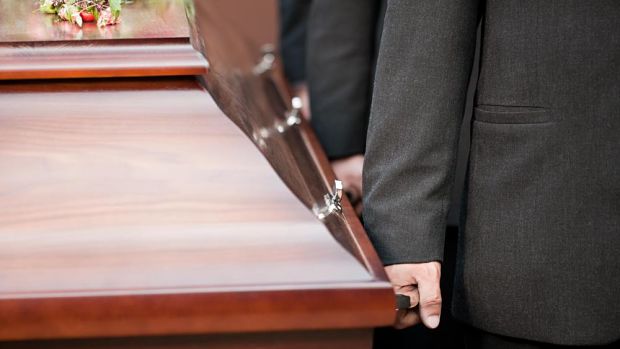Laughter at my father’s funeral, and a high-five
When my daughter high-fived me at her grandfather’s funeral, I knew everything was going to be okay. While my mother died in a moment, my father’s death came in slow increments, with Alzheimer’s disease stealing away first his mind and then his body. His final summer coincided with Molly’s last months at home before she headed off to university.
I spent a great deal of time with my dad that summer, often longing to be at home with my husband and children but conscious that his time was short. I did insist, however, that we keep to our family plans to take a few days away, one last hurrah before Molly left for school.
During the drive home from that all-too-brief respite, we got the call that Dad was dying. My husband drove through the night and I resigned myself to the fact that my plans for some mother-daughter time shopping for dorm supplies at our favourite outlet mall would be replaced by a bedside vigil at the nursing home.
As Dad remained in a deep sleep for six days, I agonized over not being able to be in two places at once and felt great guilt at not being part of Molly’s going-away preparations. I missed her already. With my father’s condition unchanged, I began to wonder whether, as had happened numerous times before, I would arrive one day to find him, Lazarus-like, up and about and once again raging against the dying of the light.
Badly in need of a break, I headed home for a shower and a quick bite with my family. As I got ready to head back out, Molly insisted on coming with me.
I’d be lying if I said I wasn’t grateful for the company, but when we arrived at the nursing home, Dad had clearly declined. Realizing he only had moments left, I tried to send Molly home. While my 18-year-old was about to embark on a whole new learning adventure, I hadn’t planned on death being part of the curriculum.
Molly was clearly unnerved by Dad’s gasping breaths, and by the fact his deep-set, dark Irish eyes, the ones we always described as having been put in with sooty fingers, were trained on her with an intensity beyond description.
I wanted to spare her, to shield her, but she refused to budge, displaying a stubbornness inherited from her grandfather.
Dad’s nurse suggested I tell my father that I didn’t want to see him suffer any longer. As I struggled to compose my thoughts – and myself – Molly began to speak. She locked her equally deep-set, dark Irish eyes on her grandfather and started reciting their shared history: the trips to Florida; how she and her siblings loved that their grandparents gave them both clothes and toys at Christmas – and that the toys always came after the clothes – inside jokes, and all the silly things grandparents share with their grandchildren.
Dad relaxed visibly, soothed by her voice and a calmness she displayed that belied her sorrow. As he slipped away, Molly and I sat at his bedside and talked. About life and university, about projects and plans, and what it means to be a family. And then he was gone. We cried, said goodbye and headed home to begin the work of planning a funeral.
As the wider family consulted, Molly expressed one wish: to be a pallbearer. I could imagine my father’s response to the idea, which would have tested all his old-fashioned ideas of gender roles. But funerals really are for the living and it seemed a perfect time to start a new family tradition.
On a sunny September morning, respecting the one ground rule that high heels should be shelved in favour of flats, Molly and her sister Charlotte joined their brothers and cousins in carrying their grandfather’s coffin out the door of the funeral home, down the front steps and along the sidewalk to the hearse where, with the effort visible on all their faces, eight grandchildren slid their grandfather’s coffin into the hearse.
And then it happened: So pleased to have accompanied her grandfather, to have broken into the all-boys club, Molly spun on her heel and turned to me, hand in the air. Instinct kicked in, and my hand met hers in mid-air. The resulting smack turned heads.
When she realized what she’d done, Molly’s hands flew to her mouth. “Mom!” she gasped, her voice a mix of horror and humour.
Our eyes met, and the two of us laughed out loud. It was the only response possible on such a beautiful day, the storm now passed. We were surrounded by the people we cared about most, celebrating the life of someone who really, really loved to laugh.
Molly headed off to school the next day. She didn’t have the matching desk set I’d planned to pick up, or the family photos I’d wanted to have framed for her dorm walls. Unlike her brothers, she didn’t have brand new towels and bedding but a random sample from the linen cupboard.
When I look back on my father’s death, I realize it taught me two key things: First, the child heading off to university really didn’t need her mother fussing over her. She could more than look after herself. And second? That when the time comes, I hope my funeral is one overflowing with laughter and high fives.
Author: Catherine Mulroney, curated from Laughter at my father’s funeral (and a high-five)


Leave a Comment
You must be logged in to post a comment.